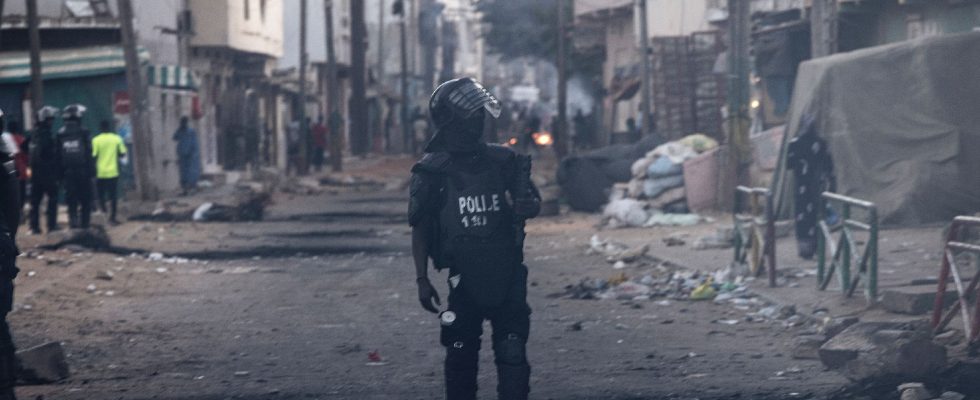For a long time, President Macky Sall made do with the nickname some people give him: “Niangal Sall” (“Severe Sall”, in Wolof). “It’s a nickname that I may have deserved, he confides in his autobiography, Senegal at heart (2019). As some have realized, I am not particularly flexible.” The qualifier no longer makes many people smile in Senegal, a country bruised after the demonstrations which claimed the lives of 16 people from June 1 to 3. The street dakaroise ignited at the announcement of the verdict against the main opponent of the head of state, Ousmane Sonko. Accused of rape and death threats by a former employee of a massage parlor, he was finally sentenced to two years in prison for “youth corruption”, enough to make him ineligible for the presidential election in February 2024. And to transform the capital into a theater of urban guerrilla warfare between pro-Sonko supporters and the police.
Macky Sall against Ousmane Sonko: the duel plunges the country, long considered an island of regional stability, into a total impasse. “We are witnessing a dangerous polarization of the political field, with a form of radicalization on both sides,” analyzes Alioune Tine, founder of the Afrikajom think tank. On the one hand, the head of state cultivates doubt about a candidacy for a third term – a highly contested scenario – and is accused of muzzling any critical voice. Several political rivals and journalists have been imprisoned, and the country has tumbled to 104th out of 180 in the latest RSF press freedom ranking. Opposite, an opponent whose speech has hardened, until adopting the slogan gatsa gatsa, “Eye for eye, tooth for tooth”. “I made my will. If Macky Sall does not back down, either he kills us or we kill him,” Ousmane Sonko said in January, in front of a crowd of excited young supporters.
The battle between the two men very soon took on the appearance of a vendetta. It begins in 2016. Sonko, a native of Casamance (South) is then almost unknown to the general public. Inspector of taxes and estates, at the head of a union founded ten years earlier, he has been denouncing for months the financial embezzlement of political figures and businessmen. Among them, Aliou Sall, a younger brother of Macky Sall, elected four years earlier to the supreme office. The ax fell in August 2016 with a decree signed by the president: Ousmane Sonko was removed from the public service for “breach of the obligation of professional discretion”. The political figure was born. He became a deputy the following year, then a presidential candidate in 2019, where he came third.
“The Ultimate Alternative”
An “anti-system” figure, he federates anger and in passing attracts the favors of radicals of all stripes. Close to Salafist circles since his studies, he also appeals to pan-Africanists hostile to France, whose economic predation on the continent he denounces. But it is in the winter of 2021, after his arrest for rape, that the forty-something is erected as an icon. A plot hatched by the power to eliminate the opponent, believes his camp. The thesis takes full speed. And for good reason: “This story comes at the end of a succession of other politico-judicial affairs which unfortunately give the impression that justice is guided by power to ward off its political opponents, analyzes Maurice Soudieck Dione, associate professor of political science at Gaston-Berger University in Saint-Louis. Before Sonko, two opposition figures, Karim Wade and Khalifa Sall, were convicted and prevented from participating in the 2019 presidential election after trials marred by irregularities .”
In the wake of the arrest, in the spring of 2021, demonstrations broke out, Total stations were ransacked, Auchan stores looted, and the human toll was dramatic: 14 dead, most of them young people who fell under the bullets of the security forces. ‘order. The point of no return has been reached. “Ousmane Sonko represents the ultimate alternative in the eyes of young people who feel marginalized, excluded from the political game, and think that they have nothing more to lose”, resumes Alioune Tine.
Opposite her, a president who has taken refuge in his ivory tower. After the last bloody incidents in June, Macky Sall has still not spoken publicly. But in his entourage the tone leaves little room for appeasement. “The State is confronted with an insurrectional project, vituperates a close friend of the president, with an opposition which throws Molotov cocktails at the homes of ministers, calls for the murder of the president and incites young people to dislodge him from his seat! The authorities must Ensure the security.” But at what cost ? In Senegal, which has never experienced a coup since its independence, the future of democracy has never seemed so uncertain.
